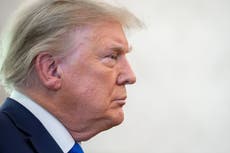What’s next for Congress after historic Covid relief deal?
Don’t expect the holiday season’s good tidings to mend the partisan rift in 2021
As Congress crosses the 2020 finish line with the exhaustion and disappointment of a marathon runner whose legs and bowels gave out miles ago, it begs the question: what’s next?
Leaders in Washington have scraped together a $900bn Covid relief deal, the second-largest bailout package in US history behind the CARES Act from March, and yet those negotiations have left a bad taste in everyone’s mouths, both Democrats and Republicans.
Lawmakers are also set to pass a $1.4trn government appropriations package to avoid a third government shutdown in four years under Donald Trump. They’ve had to pass three last-minute stopgap bills to reach this point.
They’ll have Christmas and the New Year holiday to regroup, but the road ahead for Congress is, by the bicameral body’s very nature, an endless one.
“We have more work to be done. We're not out of the woods. We have to consider measures which will address the reality of the economy in the future,” Senate Minority Whip Richard Durbin said in a speech on the Senate floor on Monday.
So the answer to the question of what’s next is this: more of the same on Covid.
That is to say, Democrats will return in January clamouring for more pandemic relief while Senate Majority Leader Mitch McConnell and his Republican colleagues rebuff such attempts, much as they did from April through July.
By the end of next month, expect the Democratic-controlled House, as it did throughout the summer and fall of 2020, to quickly pass one — or maybe even two or three — partisan relief bills worth trillions of dollars that will garner no Republican support. Those bills will die in the Senate, whose archaic rules require 60 members to keep legislation moving towards passage.
The rhetorical battle lines were already being drawn on subsequent legislation on Monday, even before lawmakers had publicly released the bill text for the $900bn Covid agreement struck over the weekend.
“This bill cannot and will not be the final word on congressional relief from the coronavirus pandemic,” Senate Minority Leader Chuck Schumer said on Monday, referring to the bipartisan package. “This is an emergency survival package. And when we come back in January, our number one job will be to fill in the gaps left by the bill, and then get the economy moving with strong federal input.”
Contrast that with the Monday remarks of Senate Majority Whip John Thune of South Dakota, who said he was “very pleased” the Senate had reached agreement on a “final Covid relief package.”
The key phrase there: “Final Covid relief package.”
We’ll see.
Those “gaps” Mr Schumer is referring to are the hundreds of billions of dollars Democrats are demanding in federal aid to state and local governments. They’re also keen on passing more direct, targeted aid for restaurants, who face a difficult winter with limited options for outdoor dining across most of the country.
Virtually every programme in the $900bn package that will become law on Monday has a smaller price tag than what Democrats wanted, so expect them to return in January with renewed demands for an increase in food stamp benefits, another round of direct payments known as stimulus checks, and an extension of the federal unemployment supplement that is set to give jobless Americans $300 per week in addition to their state unemployment checks.
Republicans have been advocating for months for a sweeping bill that would shield businesses, health care providers, and school systems from liability lawsuits stemming from exposure to the virus.
Each party is fundamentally and aggressively opposed to the other’s top priority — state and local aid (Democrats) and the liability shield (Republicans).
Mr McConnell has variously called federal coronavirus assistance to states and localities a “bailout” and a “blank check” for blue states whose budgets were already strained before the pandemic, although Democrats have provided Covid-specific guardrails for any forthcoming funds.
And Democrats have panned the liability shield as a gift to “corporations” who would put profits over the health of their employees and customers with such legal protections.
It’s hard to envision how any compromise legislation could take shape, especially with talks tabled until Mr McConnell is willing to sit down again for negotiations. And it’s anyone’s guess when that’ll be.
Lawmakers share all Americans’ desire to move past a nightmarish 2020.
“I want to say happy winter solstice. 2020 is almost gone,” Mr Durbin said at the outset of his remarks on Monday.
“It's an announcement I made to my family this morning, and I hope America shares it. We are turning a corner as a nation into a new year and a new season. And, I hope, a much better day for all of us across this country.”
As far as Congress goes, Republicans’ appeasement of a viciously bitter and undemocratic Donald Trump in the weeks since his electoral loss to President-elect Joe Biden portend even more turbulent times ahead in Washington.
Join our commenting forum
Join thought-provoking conversations, follow other Independent readers and see their replies
Comments




Bookmark popover
Removed from bookmarks